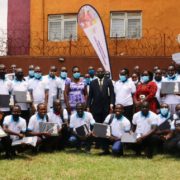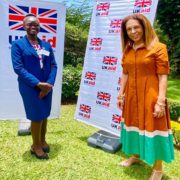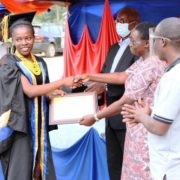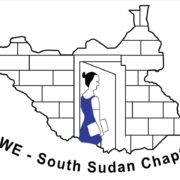By David Omoding
FAWE Uganda
The Forum for African Women Educationalists (FAWE) Uganda Chapter on Saturday 27th March, 2021 recognized and awarded 40 Science Teachers – teaching biology, chemistry, physics and mathematics with brand new laptops and scholastic materials to facilitate the teaching and learning process in their schools, bringing the total numbers of teachers awarded over the project period to 93. The awards are aimed at appreciating teachers for their outstanding performance and contribution to the body of Science knowledge, inspiring and motivating other teachers to contribute towards developing and promoting science education in schools; creating school role models that interest girls to do STEM (Science, Technology, Engineering and Mathematics) subjects and later take-up Science career paths.
Mr. Arthur Makara, the Commissioner for Science Innovation and Outreach, Ministry of Science and Technology expressed that, “As Government we Appreciate FAWE and Dubai Cares for implementing STEM intervention in Uganda. We supported this program right from inception because of the associated benefits and we call for its continuation to consolidate registered achievements.”
He added that, “For girls to embrace Sciences, we need to continue engaging parents, families and communities as they are the ones discouraging girls from climbing electricity poles. We lag behind as a country because we have not embraced Sciences fully. It’s the reason we are importing everything today including simple things that can be made here. The Government of Uganda noticed this and it’s the reason we are mainstreaming Science education now including increasing better pay for teachers so that they are motivated to teach.”
Mrs. Martha Muhwezi, Executive Director, FAWE Africa noted that, “Many girls are discouraged from doing Sciences because of the misconception that, they are meant for boys, which is wrong. It has been proven that each one of us, if given the opportunity and support can do Sciences. For Instance, FAWE came in, motivated girls and supported schools to simplify the teaching of STEM subjects. The results now demonstrate that girls too can do sciences, following the increase in the number of girls doing sciences and improved performance registered.”
To sustain the achievements realized, she called upon governments to increase funding and investment towards Science education across all schools as Science and innovation greatly contributes towards development of a country. For example, shortage of Science teachers and lack of laboratory equipment and text books in schools needs to be urgently addressed.
Ms. Susan Opok Tumusiime, Executive Director, FAWE Uganda said that, “We have awarded 40 science teachers, to appreciate their effort and sacrifice in teaching and guiding students to realize their dreams through simplifying the teaching of Science subjects and adaption of practical approaches. Resulting into improved performance and increase in number of girls offering science subjects. This occasion has showcased to other teachers that whatever situation or circumstances surrounding them, they can still contribute towards making Uganda a better place especially by nurturing young scientists and innovators who are the future of this great nation.”
The teachers represented 40 project schools covering different regions and districts of Uganda; Y.Y Okot Memorial College in Kitgum, Moyo S.S, Semuliki High School in Bundibugyo, Karugutu S.S in Ntoroko, Kyebambe Girls School, Kangole S.S, Moroto high school, Katakwi high school, Mt of Olives College Kakiri, Mityana Secondary School, Kitante Hill School, Wanyange Girls’ and Iganga Girls’ Secondary School.
The awarding ceremony was officiated by Dr. Betty Nannyoga, Associate Professor of Bio-Mathematics at Makerere University and Chairperson of both Uganda Women Mathematicians, and Eastern Africa Network of Women in Basic Science who expressed her appreciation to FAWE and Dubai Cares for the initiative. She also appreciated the teachers for giving it their best – teaching young people, ensuring they learn and impact the society. She further added, “I call upon teachers to continue implementing what they have learnt from the project especially practical teaching approaches of group discussions and presentations, debates, experiential learning, close interaction, research and reward systems. Government needs to pick learning’s from this intervention and scale-up across the Country.”
One of the Teachers, Mrs. Judith Akumu, of Kitante Secondary School thanked FAWE Uganda for partnering with the school to implement the intervention. She indicated that, “Before the STEM project, boys used to mainly engage in practical work during Science practicals while girls took notes. As a result of the intervention, girls no longer fear to do practical work as their confidence has been built, attitudes changed and they now believe in themselves and competing/beating boys in performance. They have become creative and have an opportunity to develop innovations addressing community needs from the different Science concepts learnt in class. The innovations developed have been presented in different forums including national and international Science competitions hence exposing girls at higher forums.”
- The awards follow a three (3) year project on Promoting Science, Technology, Engineering and Mathematics amongst girls in Ugandan Schools, implemented by FAWE Uganda through FAWE Africa with funding from Dubai As a result, the intervention registered a number of achievements including; Increased school enrolment in STEM partner schools (Biiso War Memorial Secondary school in Masindi District from; 450 in 2017 to 734 in 2019 learners), only school in the district offering Sciences at A ‘level; Effective 2020, Ikoba Girls committed to start offering sciences at A ‘level
- improved performance and uptake of girls pursuing science careers – 35 girls enrolled for nursing at Sebei College Tegere – one qualified to pursue Medicine on Government Scholarship
- Biiso War Memorial, Duhaga S.S, Kangole Girls and Morulem, increased ability of learners to question Science concepts & seek deeper understanding thus prompting both teachers and learners to research more
- Increased motivation among learners – especially girls to do practicals
- Improved discipline and lesson attendance in Science subjects and increased access to teaching and learning materials by both teachers and learners as a result of scholastic materials – text books, lab equipped and laptops procured for partner institutions.
Progressively, learners developed a number of innovations addressing community problems including; office communicating devices for people living with disability, locally made blender machines, Wheel Propelled Sprayers, Hydraulic Excavators, hand washing Soap, Water Tank System, locally made washing machines, and re-usable sanitary pads. The event was attended by various dignitaries – Education Civil Society Organizations, School Administrators, Teachers, officials from Ministry of Education and Sports; and Science and Technology.

























